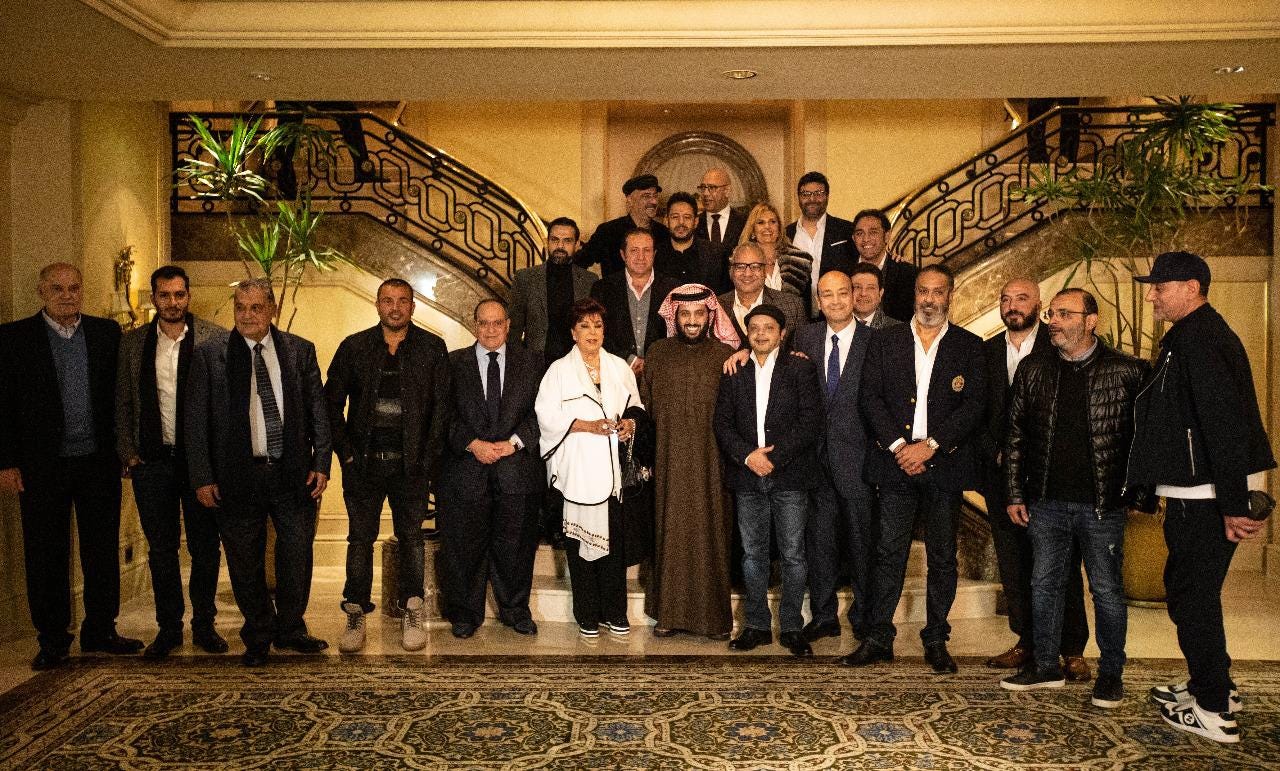“With absolute bluntness, we go to Saudi Arabia to get money,” declared Egyptian actor Bayoumi Fouad often described as “more Saudi than Saudis themselves” highlighting how Riyadh Season once served as a lucrative “livelihood gateway” for Egyptian artists. Yet that very gateway an open stage in one of the region’s largest cultural spectacles is now being shut.
Just days ago, Turki Al‑Sheikh, head of Saudi Arabia’s General Entertainment Authority, delivered a startling announcement about the upcoming Riyadh Season: after drawing more than 19 million global visitors in its previous edition, the event would now rely primarily on Saudi and Gulf singers and theater performers, with opportunities extended to Syrians and international acts—but notably silent on Egyptian participation.
What matters most is not only what the “advisor” did say, but what he conspicuously omitted: Egyptian artists, who played a foundational role in Riyadh’s events since its launch six years ago and were deeply cherished by both Al‑Sheikh and Saudi audiences—even some granted Saudi citizenship—have been erased from the narrative.
Though the move appears cultural on its surface, it swiftly ventures into political terrain, reframing the event’s exclusion of Egyptians as emblematic of the intricate perhaps strained dynamics between Cairo and Riyadh. Does this mark a shift in regional soft power, or have political fissures finally spilled into the cultural realm?
The End of a Honeymoon with Egyptian Artists
Since its inception in 2019, Riyadh Season has become one of the largest entertainment festivals in the region, featuring grand concerts, theatrical productions, and mass gatherings.
Under Al‑Sheikh's oversight a figure both revered and feared the festival showcased celebrated Arab artists, especially from Egypt and Lebanon, whose appearances filled venues, aired on television, and occasionally provoked controversy regarding cultural propriety.
A recent social media post by Al‑Sheikh praising Syrian theater (without mention of Egypt) suddenly read like a dramatic breakup with the posting of a photo featuring Syrian star Ayman Zidan confirming the shift.
Egyptian artists, who had answered the call to participate in 2023 even as Gaza endured deadly bombings, shouldered public criticism at home and yet had helped revive Riyadh Season’s momentum. Now, they find themselves replaced by Syrian artists.
Moreover, this shift follows Al‑Sheikh’s earlier mocking of Egyptian Transport and Industry Minister Kamel El‑Wazir over road construction costs a context that fans political subtext.
Egyptian responses have been mixed: ex‑Minister of Information Anas El‑Feki framed the decision as open to interpretation was there fatigue with Egyptian criticism, an artistic repetition, or simply changing festival strategy?
Meanwhile, Egyptian–Saudi media figure Amr Adib, usually aligned with the Egyptian regime, staunchly defended Al‑Sheikh, turning the debate into a broader media spectacle.
Comedian Mohamed Henedy himself holding Saudi citizenship offered neither criticism nor defense, merely thanking Saudi Arabia and Al‑Sheikh for their past support. Social media in Egypt ranged from derision accusing the artists of “selling out”—to indignation or self‑reflection on Egypt’s own infrastructure and artistic potential.
Some Egyptians doubted Riyadh Season’s success absent Egyptian talent, while others interpreted the move as symbolic of Riyadh distancing itself from Cairo’s cultural dominance.
A Soft Blow to Egyptian Livelihoods
Riyadh Season has long been a major economic platform for Egyptian artists providing performance contracts in a rising Saudi entertainment market. Many in Egypt understood that criticizing Al‑Sheikh risked “having one’s livelihood cut off.”
The exclusion underscores the reach of the Saudi entertainment apparatus, which invests heavily in Egyptian production entities, broadcast channels, and content distribution networks. Egypt, in turn, reaped financial opportunities but with that came vulnerability.
Excluding prominent Egyptian artists is more than a cultural loss; it threatens cultural exchange, artistic investment, and broader professional opportunities. There is even concern it could spill into other sectors tourism, investment, and beyond—at a time when Saudi financial support has been stabilizing Egypt’s faltering economy under Sisi’s rule.
More Than an Artistic Gesture
Al‑Sheikh's decision cannot be viewed in isolation from Egypt‑Saudi political shifts. Their relationship has fluctuated between collaboration and tension spanning sports, culture, and economic aid. More recently, Egyptian audiences criticized a Saudi-supported film starring Ahmed Helmy, seen as perpetuating negative stereotypes of Egyptians.
Al‑Sheikh frames the move as nurturing local and Gulf arts. Yet the implications are broader: it could represent Saudi Arabia’s push for regional cultural sovereignty asserting its emerging entertainment industry amid a traditionally Egypt‑dominated Arab cultural sphere.
This strategy may also serve as a symbolic message to Egypt’s leadership suggesting that Saudi Arabia no longer views Egypt solely as a trusted cultural ally. Rather, Riyadh may be signaling impatience with a system it deems overly extractive and strategically passive.
Simultaneously, the decision comes as regional tensions rise particularly over Gaza. Many argue the festival, amid humanitarian crisis, could have emphasized Arab solidarity instead. Excluding Egyptian artists in that context has drawn criticism for skewing priorities from empathy to spectacle.
Will the Rift Surface?
A decision of this magnitude likely has backing from Saudi leadership not merely a personal whim of Al‑Sheikh. While public bilateral cooperation remains, the warmth has noticeably cooled. Shared interests on Sudan or Red Sea security have not quelled deeper disagreements—over Syria’s reintegration, Egypt’s growing ties with Iran, or contentious issues like Tiran and Sanafir islands.
Such tensions have eroded trust and the sheen of alignment. Cultural disengagement, especially from Egyptian contributors, may deepen that divide. The consequences could reverberate across diplomatic, economic, and cultural spheres.
Ultimately, Al‑Sheikh’s decision is a litmus test for Egypt–Saudi rapprochement amid mounting regional uncertainty. For two of the Arab world’s most powerful nations, the cost of tension is high and cultural estrangement may signal deeper distances ahead.


